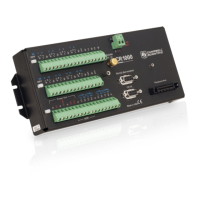• Level 2 — Data collection is unrestricted, requiring no security code. If the
user enters the Security2 code, the datalogger clock can be changed and
variables in the Public table can be changed.
• Level 3 — When this level is set, all communication with the datalogger is
prohibited if no security code is entered. If Security3 code is entered, data
can be viewed and collected from the datalogger (except data suppressed by
the TableHide() instruction in the CRBasic program). If Security2 code is
entered, data can be collected, public variables can be set, and the clock can
be set. If Security1 code is entered, all functions are unrestricted.
8.11.2.1 Pass-Code Lockout By-Pass
Pass-code lockouts can be bypassed at the datalogger using a CR1000KD
Keyboard Displaykeyboard display. Pressing and holding the Del key while
powering up a CR1000 will cause it to abort loading a program and provide a 120
second window to begin changing or disabling security codes in the settings editor
(not Status table) with the keyboard display.
Keyboard display security bypass does not allow telecommunication access
without first correcting the security code.
Note These features are not operable in CR1000KDs with serial numbers less
than 1263. Contact Campbell Scientific for information on upgrading the
CR1000KD operating system.
8.11.3 Passwords
Passwords are used to secure IP based communications. They are set in various
telecommunication schemes with the .csipasswd file, CRBasic PakBus
instructions, CRBasic TCP/IP instructions, and in CR1000 settings.
8.11.3.1 .csipasswd
The .csipasswd file is a file created and edited through DevConfig (p. 111), and
which resides on the CPU: drive of the CR1000. It contains credentials
(usernames and passwords) required to access datalogger functions over IP
telecommunications. See Web Service API
(p. 423) for details concerning the
.csipasswd file.
8.11.3.2 PakBus Instructions
The following CRBasic PakBus instructions have provisions for password
protection:
• ModemCallBack()
• SendVariable()
• SendGetVariables()
• SendFile()
• GetVariables()
• GetFile()
• GetDataRecord()
470

